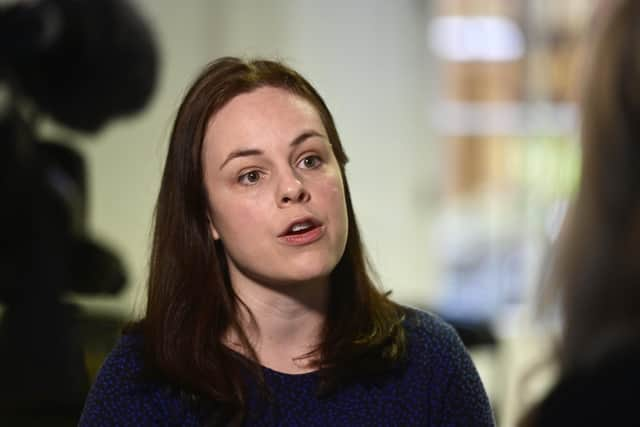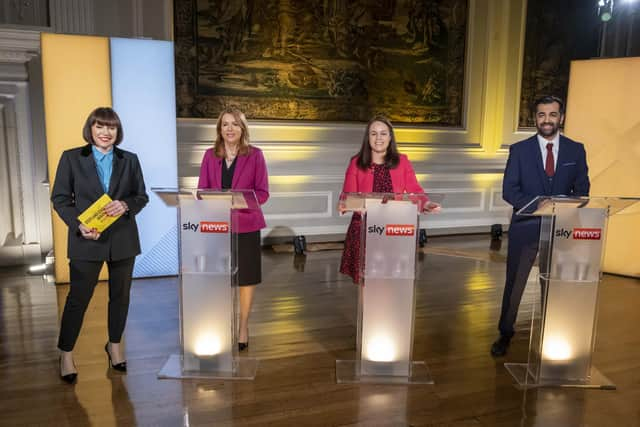SNP leadership race: Kate Forbes refuses to commit to conversion therapy ban as TV debate fails to spark into life
At times, the debate made excruciating viewing, while at others, it failed to reach the passion of the candidates’ previous outings.
Held in Hopetoun House, on the banks of the Forth, host Beth Rigby noted the grand building was constructed in 1707 - the year of the Scottish Act of Union - and set the debate off by asking the prospective leaders if the dissolution of that union was their top priority.
Advertisement
Hide AdAdvertisement
Hide AdHumza Yousaf was the only candidate to definitively say yes, saying independence is “inevitable”, but will “take time”, involving “building a consistent majority in favour of independence”.


Ash Regan positioned herself as the straight talking candidate, making bold claims that under her plans, Scotland would be independent within three years - something the other two candidates could not affirm clearly. However, Regan is far behind her rivals in polling, meaning she can afford to make grand promises with no real prospect of being allowed to attempt them.
Such bold promises came back to bite her, as during an uncomfortable and lengthy section of the debate, Rigby pressed Regan on what institutions would be needed to complement the candidate’s promise of a central bank. Regan could not answer, for several excruciating minutes.
Inevitably, Kate Forbes was quizzed on her attitudes towards social issues, after her campaign was very nearly derailed in the early stages of the contest after her religious views on gay marriage were brought into question.
Quizzed on conversion therapy by Rigby, the finance secretary described it as “abhorrent” but stopped short of saying she would ban the process entirely.


When repeatedly asked if she would ban voluntary conversion therapy, Forbes said: “My commitment to you is to look carefully at (banning voluntary conversion therapy).
“What I’m not going to do, because I don’t think any government has done that yet, it is to precede the normal process of legislation.”
She added: “I think people should be allowed to live freely as they choose and I don’t think there should be conversion therapy in existence in Scotland.”
Advertisement
Hide AdAdvertisement
Hide AdAsked if a gay man should be allowed to seek conversion therapy to change his sexuality, Forbes said: “Well, it’s his choice, but I do not think we should allow conversion therapy.”
The finance secretary added: “My position on this is that people should be allowed to live as they choose in a free, tolerant society, and I think the conversion therapy Bill should reflect that.”
New polling published ahead of the debate suggested Yousaf’s track record in government has severely damaged Scottish voters’ opinion of him as a prospective First Minister. His competency for the top job became a focal point of the debate.
“I accept we have to reach out to No voters but it is so important that we don’t lose our own supporters,” the health secretary said, “and the way we do that is by not abandoning our progressive agenda, isn’t that right?”
Forbes said: “On the polling, I don’t think that’s where you’re particularly strong.
“I have not only got net positive ratings, I have actually got higher net positive ratings than either of the opposition leaders. That is what matters for an election winner.”
Over the weekend, deputy first minister John Swinney and SNP Westminster leader Stephen Flynn both announced their support for Yousaf to succeed Sturgeon, leading to accusations from Forbes’ campaign that it showed the party was “absolutely panicking”.
At the time, Yousaf rejected these claims, saying it was a “sign of strength” that he had been backed by “stalwarts” of the movement.
Advertisement
Hide AdAdvertisement
Hide AdThe debate was an opportunity for the leadership hopefuls to address SNP members directly as voting opened.
Party members have been able to vote online since noon on Monday using the Single Transferable Vote system, with the result set to be announced after the ballot closes in a fortnight, on Monday March 27.
Party members - of which there are reportedly 78,000, although the SNP is secretive about the actual figure - will be asked to rank the three candidates in order of preference, and if no single candidate secures more than 50 per cent of votes on first preferences, the person in third place will be eliminated.
New polling published ahead of the debate suggests support for independence has dropped to just 39 per cent, suggesting the SNP leadership race has damaged the party’s prospects of attaining Scottish independence.
A YouGov survey, commissioned by Sky News to coincide with the leadership debate, has revealed just 39 per cent of Scots are backing an exit from the UK, compared to 47 per cent who want to remain part of the union.
The gap is no smaller when those who answered ‘don’t know’ are excluded from the data, leaving support for independence at 46 per cent, compared to 54 per cent against.
The survey of 1,002 people, interviewed online over the weekend, also found that 52 per cent of the public believed Scotland would still be part of the UK in ten years' time, regardless of how they would vote in an independence referendum.
Of the survey respondents, Forbes was found to be the most popular, with 27 per cent saying she would be a good first minister, against 22 per cent for Yousaf, and 14 per cent for Regan.
Advertisement
Hide AdAdvertisement
Hide AdHowever, all three were considered to be bad prospective leaders of Scotland, with 44 per cent of respondents feeling Yousaf would make a bad leader of the country, against 39 per cent with similar feelings towards Regan and 36 per cent for Forbes.
Yousaf, who was elected to the Scottish Parliament in 2011, was widely praised for his work on issues such as race equality, social justice, and human rights during his tenure as justice secretary, but his time as health secretary has been fraught with accusations of incompetence amid an NHS winter crisis.
Once considered a rising star in the party, and Sturgeon’s heir apparent, the latest polling shows the Scottish public has serious doubts regarding the health secretary’s leadership capabilities.
Meanwhile, Forbes’ tenure as finance secretary before taking maternity leave was dominated by the coronavirus pandemic and strong showings in Holyrood - including the first presentation of the Scottish Budget to parliament by a woman in February 2020, when she took over from Derek MacKay with just hours’ notice.
This is perhaps why Forbes received the highest figures for those who thought she would be a strong leader at 28 per cent, competent at 37 per cent and trustworthy at 30 per cent.
Comments
Want to join the conversation? Please or to comment on this article.